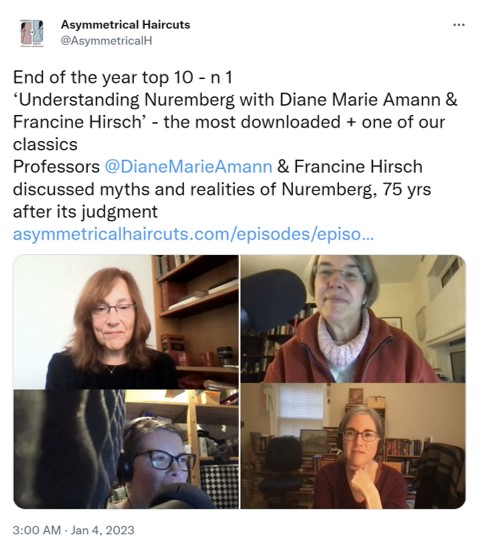
Among the international law experts featured in a podcast honoring the last surviving Nuremberg prosecutor is a Faculty Co-Director of our Center, Professor Diane Marie Amann.
The tribute, entitled “In Memoriam: Benjamin B. Ferencz,” was released recently at Asymmetrical Haircuts: Your International Justice Podcast. In it, the podcast’s co-founders, journalists Janet Anderson and Stephanie van den Berg, first provided their own memories of Ferencz, who died on April 7 in Florida, at age 103. They continue with comments not only from Professor Amann, but also from Christopher “Kip” Hale, Adama Dieng, David Donat Cattin, and Ferencz’ son, Don Ferencz.
As a twenty-something lawyer, Ferencz had played a role post-World War II trials at Nuremberg, leading the Einsatzgruppen trial. (His wife, Gertrude Fried Ferencz (1919-2019), likewise worked at the trials, in administrative capacities.) He remained active throughout his life in promoting international criminal law – to quote his own favorite phrase, campaigning for “Law, Not War.”
The comments by Amann, who is Regents’ Professor of International Law and Emily & Ernest Woodruff Chair in International Law here at the University of Georgia School of Law, drew from a tribute she posted here the day after Ferencz’ passing.
(Depicted in photo montage at podcast website: from top left, Amann interviewing Ferencz at International Humanitarian Law Dialogs, Chautauqua, New York; Ferencz with inter alia his son Don Ferencz, Kip Hale, and then-Prosecutor of the International Criminal Court, Fatou Bensouda; prosecutor Ferencz addressing a court at Nuremberg; and Ferencz on a bench dedicated to him at the Peace Palace at The Hague, the Netherlands, in which the phrase “Law Not War” has been carved)









